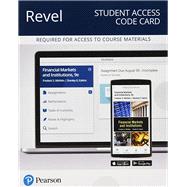Revel™ is Pearson’s newest way of delivering our respected content. Fully digital and highly engaging, Revel replaces the textbook and gives students everything they need for the course. Informed by extensive research on how people read, think, and learn, Revel is an interactive learning environment that enables students to read, practice, and study in one continuous experience--for less than the cost of a traditional textbook.
Real-world applications help readers navigate the shifting financial landscape
Revel Financial Markets and Institutions takes a practical approach to the changing landscape of financial markets and institutions. Best-selling authors Frederic S. Mishkin and Stanley G. Eakins use core principles to introduce readers to topics, then examine these models with real-world scenarios. Empirical applications of themes help readers develop essential critical-thinking and problem-solving skills, preparing them for future careers in business and finance. The 9th Editioncombines the latest, most relevant information and policies with the authors’ hallmark pedagogy and interactive media to provide a refined tool to improve the learning experience.
NOTE: Revel is a fully digital delivery of Pearson content. This ISBN is for the standalone Revel access card. In addition to this access card, you will need a course invite link, provided by your instructor, to register for and use Revel.











